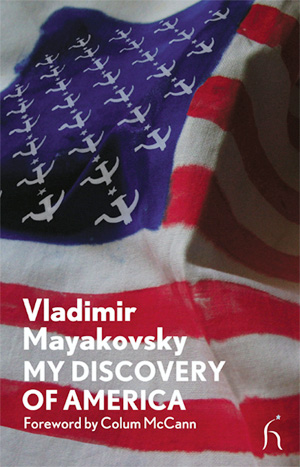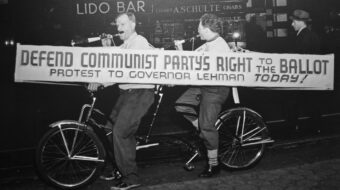
Vladimir Mayakovsky (1893 – 1930) is probably best known for his poetry, plays and general Bolshevik agitprop from the early days of the USSR. American audiences however may find the travel narrative of the three months he spent in the Western hemisphere in 1925 to be a more accessible literary contribution, and thanks to the publisher Hesperus, the book “My Discovery of America” is now available as part of their ‘Modern Voices’ series.
Mayakovsky opens the documentation of his journey by saying “I have lived too little to describe every detail accurately and thoroughly. This little I have lived is enough though, to be able to render the miscellaneous faithfully.”
In a trip that included Mexico and Cuba, Mayakovsky’s definition of America and his trip to it quite rightly expand beyond the borders of the United States. He notes there is a North, South, and Central America and goes on to observe, “The USA do not even take up the whole of the North – but never mind! – they have grabbed, appropriated and mixed up the name of all the Americas…the United States has established the right to call itself ‘America’ by force, by means of dreadnoughts and dollars, putting fear into neighboring republics and colonies.”
In his own country Mayakovsky was known as a ‘Futurist’ and in the forward to the book, Colum McCann compares the emotion of his poetry about American topics to that of Crane or Whitman, but in reading his commentary about his unfamiliar surroundings one is reminded more of the gonzo journalism that would not be popularized until almost fifty years later. Have a look at this entry regarding the traffic in Mexico City, “A driver in Mexico City is not responsible for injuries (watch out for yourself!), therefore the average expectation for life without injury is ten years. Once every ten years everyone gets run over. It’s true there are people who may go twenty years without getting run over, but that’s at the expense of those who have already been run over within five years.”
In addition to the political and the social, Mayakovsky proves to be a keen observer of the cultural. His notations on traveling the US by Pullman car are uproarious. He is also not above poking fun at himself and his often poor grasp of the English language. In addition, there are more than one fish out of water type mishaps which he records for the reader’s amusement.
A good deal of New York left Mayakovsky not only thoroughly unimpressed but somewhat testy to boot. He positively hated Coney Island, of which he writes, “I have never seen such depravity stimulating such ecstasy.” His literary tongue lashing of the weekend refuge may also have had something to do with the fact that an unscrupulous amusement attendant cheated him there. New York natives should take heart however, Mayakovsky’s soul was stirred by the site of the Brooklyn bridge and his poem of the same name, which appears in the book, serves as a tribute to the ever inspiring monuments of New York upon which goggle eyed visitors continue to fix their gaze.
The city of Chicago, which according to the author, in comparison to New York could “live without bluster”, seemed a bit more to his liking and he praises its energy. There was one aspect of life in Chicago however that he found particularly unappealing. He visited the famed stockyards, and described the outside as “the imaginary – or the real – smell of an entire sea of spilt blood sends your head spinning” and of the interior of the slaughter houses he noted, “here you get all the squealing and the snorting, but at the other end of the works they are already putting seals on the legs of meat – white tin cans, discharged like hailstones, flash in the sun like streaks of lightning.”
While in the mid-west he also tours a Ford plant in Detroit and afterwards discusses conditions of same with a correspondent from this very paper, then known as ‘The Daily Worker’.
Some of the authors observations carry the very specific time stamp of the date on which he put his pen to paper and should be taken as such, but others are perhaps more relevant today then when he wrote them, such as when he says, “There isn’t a country that spits out as much moralistic, lofty, idealistic, sanctimonious rubbish as the United States.” He also suggests that instead of Washington, DC, foreign ambassadors should be posted to Wall Street since that is where the real power is. Other times his is almost eerily prescient. In writing a full 15 years before the attack on Pearl Harbor he suggests it may well be the Japanese that challenge the Americans for dominance and whilst witnessing the ongoing industrialization of America he also speculates that it may all one day be replaced by an economy solely based on high finance, writing, “America will become just a financial centre, a money broker of a country.” Nor did the boiling racial oppression of the United States escape his observation, writing, “The Negroes who are heated up over the bonfires of Texas may yet prove to be a sufficiently dry powder for explosions of revolution.”
The final footnote of Mayakovsky’s attitude toward the maddening sights and sounds of America in the roaring 20’s is probably best summed up by the fact that after using up only three months of a six month visa he packed his bags and went home to Moscow.
If a lovelorn suicide had not cut short his life, Mayakovsky would have surely marveled at the achievements to come in his own country. One can only imagine what poetry he would have produced in honor of Yuri Gagarin’s maiden space voyage. Thankfully the literature he produced lives on and we are fortunate to now have this more obscure entry about our own American history to stimulate our senses.
My Discovery of America, by Vladimir Mayakovsky
Hesperus Press
Paperback, 144 pages, $15.95
Photo: Hesperus Press










